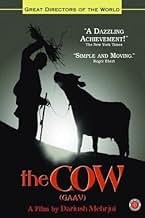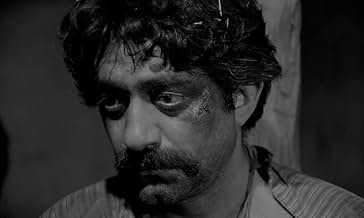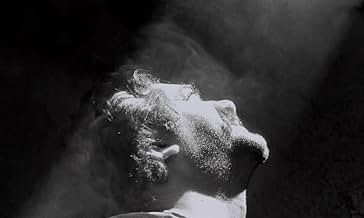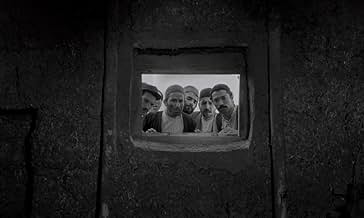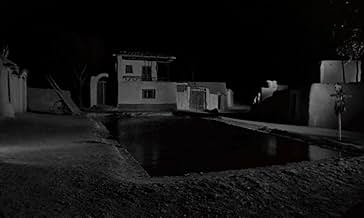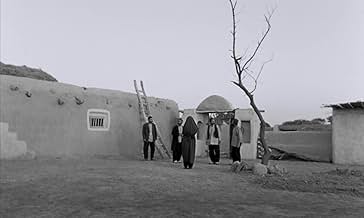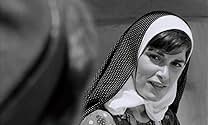IMDb-BEWERTUNG
7,8/10
8479
IHRE BEWERTUNG
Ein alter Dorfbewohner, der tief in seine Kuh verliebt ist, geht für eine Weile in die Hauptstadt. Während er dort ist, stirbt die Kuh und jetzt haben die Dorfbewohner Angst vor seiner mögli... Alles lesenEin alter Dorfbewohner, der tief in seine Kuh verliebt ist, geht für eine Weile in die Hauptstadt. Während er dort ist, stirbt die Kuh und jetzt haben die Dorfbewohner Angst vor seiner möglichen Reaktion darauf, wenn er zurückkehrt.Ein alter Dorfbewohner, der tief in seine Kuh verliebt ist, geht für eine Weile in die Hauptstadt. Während er dort ist, stirbt die Kuh und jetzt haben die Dorfbewohner Angst vor seiner möglichen Reaktion darauf, wenn er zurückkehrt.
- Regie
- Drehbuch
- Hauptbesetzung
- Auszeichnungen
- 2 Gewinne & 1 Nominierung insgesamt
Empfohlene Bewertungen
While it's director went on to do better work and this film marks a return of cinema to the post Shah Iran, sitting through it is an effort.
We lose out both ways with the basic technique and unshaded characters of underdeveloped cinema (this one is like an early Yilmas Guney but nowhere near as good) made pretentious by what we must assume is opaque symbolism on the Kafka model.
This village overfills it's quota of idiots.
Best thing is the title background of the man walking a cow, reduced to an abstract.
We lose out both ways with the basic technique and unshaded characters of underdeveloped cinema (this one is like an early Yilmas Guney but nowhere near as good) made pretentious by what we must assume is opaque symbolism on the Kafka model.
This village overfills it's quota of idiots.
Best thing is the title background of the man walking a cow, reduced to an abstract.
This movie is about as far as one can get from Hollywood blockbusters. Its about a cow. About a cow and a very loving owner. And what happens to them ultimately. There's melancholy and madness in the tragic ending. But the movie also scales new heights in the bonding between human and animals, in this case, a cow. The camera has been used is a surreal way. Shadows and people mix creating a spookiness which adds to the oddity of the general environment depicted. There's very palpable tension in the movie, created by the elements related to the cow and the three shadowy thieves who perhaps symbolize lawlessness. What also struck me was the looming silence of the black burkah-clad women and occasion glimpses of their crinkly faces. All very surreal. There are some very interesting personalities which come alive through the script, other than the cow of course!
"The cow" (1969) from Dariush Mehrjui can be called (with a little exaggeration) the founding film of Iranian (art house) cinema. In an interview Mehrjui told that the Italian neorealists were his big examples in making this film.
Dariush Mehrjui was born in 1939. He is therefore a contemporary of Bahram Beizai (born 1938) and Abbas Kiarostami (born 1940). Nevertheless Mehrjui is THE director of Iran before the Islamic Republic of 1979.
"The cow" tells the story of a man losing his only cow. Caring for this cow was the cornerstone of his life and the source of his status in the village. The theme of the film is the reaction of the man to his misfortune and the way the villagers cope with his reaction.
In this time of professional psychiatric treatment maybe there is something to be learn from the degree of involvement of the villagers with their neigbour. Hoewever the schocking final scene shows what can happen when involvement turns into powerlessness.
Apart from the man with the cow there are a lot of other things happening in the village. They are hinted at, but we can not speak of elaborated sub-plots. There is for example a couple in love probing every opportunity to be together unnoticed. The glances they exchange speak for themselves. After all this film was made before the Islamic revolution of 1979.
Dariush Mehrjui was born in 1939. He is therefore a contemporary of Bahram Beizai (born 1938) and Abbas Kiarostami (born 1940). Nevertheless Mehrjui is THE director of Iran before the Islamic Republic of 1979.
"The cow" tells the story of a man losing his only cow. Caring for this cow was the cornerstone of his life and the source of his status in the village. The theme of the film is the reaction of the man to his misfortune and the way the villagers cope with his reaction.
In this time of professional psychiatric treatment maybe there is something to be learn from the degree of involvement of the villagers with their neigbour. Hoewever the schocking final scene shows what can happen when involvement turns into powerlessness.
Apart from the man with the cow there are a lot of other things happening in the village. They are hinted at, but we can not speak of elaborated sub-plots. There is for example a couple in love probing every opportunity to be together unnoticed. The glances they exchange speak for themselves. After all this film was made before the Islamic revolution of 1979.
In the small village where he lives, Masht Hassan is well-known because he owns the only cow. Needless to say he is very protective of the animal and treats it like the child he and his wife do not have bathing, feeding and playing with it; his main worry is that the neighbouring Boulouris will come in the night and steal it away. However while he is away one day, the cow starts to bleed from the nose and die faced with having to tell him it is dead, the villagers bury the body and agree to tell him it has strayed. When Hassan returns he cannot believe it and soon is spending nights on the roof of the barn waiting for it to return, part of a gradual spiral downwards with no end Considered to be one of the landmark films in the history of Iran as a force as a film producing nation, this will be a harder sell to Western audiences (myself included) who perhaps cannot understand the context of the story and some of the deeper meaning that, I assume, this story has. The plot is simple and it seems to show the mental decline of Hassan and the village's collective inability to deal with that within the confines of daily life. In painting a realistic picture of village life (the film was shot using a mix of actors and real villagers) the film maintains an interesting setting even if the development is rather slow and unsatisfying. It requires you to think of course, but I didn't think I had the knowledge to really appreciate it and I suspect that many other viewers will struggle for the same reason.
The stark direction is good but I'm not sure if it suited the material as I would have preferred a washed out colour to compliment the sentiment in the film. It worked though and the performances are mainly good Entezami in particular convincing in his slide into instability. Worth seeing because of its stature within Iranian cinema then, but perhaps you need a greater understanding of the culture than I if you are to take more from it. Even still it is interesting in its view of village life and the attitude towards mental illness.
The stark direction is good but I'm not sure if it suited the material as I would have preferred a washed out colour to compliment the sentiment in the film. It worked though and the performances are mainly good Entezami in particular convincing in his slide into instability. Worth seeing because of its stature within Iranian cinema then, but perhaps you need a greater understanding of the culture than I if you are to take more from it. Even still it is interesting in its view of village life and the attitude towards mental illness.
Very primitive. Villagers don't speak, they take turns, as if on cue, to SHOUT their lines at the top of their lungs, and in a pronounced Tehrani accent at that. The incessant SHOUTING gets annoying real fast.
What makes things worse is that the sound level is the same regardless of the actors' distances from the scene. Someone shouting from the top of a roof several houses away is as loud as someone standing next to you. If you don't look at the screen, you will get the feeling that all actors are standing around a single microphone and shouting into it.
This could have been a much better movie in the hands of a more experienced director and crew but as it is, I couldn't stand it. Fast-forwarded through.
What makes things worse is that the sound level is the same regardless of the actors' distances from the scene. Someone shouting from the top of a roof several houses away is as loud as someone standing next to you. If you don't look at the screen, you will get the feeling that all actors are standing around a single microphone and shouting into it.
This could have been a much better movie in the hands of a more experienced director and crew but as it is, I couldn't stand it. Fast-forwarded through.
Wusstest du schon
- WissenswertesFinanced largely by the Shah's government, the producers were aghast at the finished film as they felt that it made Iran look like it was a completely backwards country. The film was only allowed to be released with a disclaimer attached stating that the events depicted happened long before the then existing regime.
- PatzerWhen a woman goes to Mash Hassan to get milk, a man tells her that one cow is all they have in the village. This should be impossible because a female cow cannot get pregnant on her own and lactate.
- Zitate
Masht Hassan: I'm not Hassan. I'm his cow.
- VerbindungenFeatured in Cinema Iran (2005)
Top-Auswahl
Melde dich zum Bewerten an und greife auf die Watchlist für personalisierte Empfehlungen zu.
- How long is The Cow?Powered by Alexa
Details
- Laufzeit
- 1 Std. 44 Min.(104 min)
- Farbe
- Sound-Mix
- Seitenverhältnis
- 1.37 : 1
Zu dieser Seite beitragen
Bearbeitung vorschlagen oder fehlenden Inhalt hinzufügen

